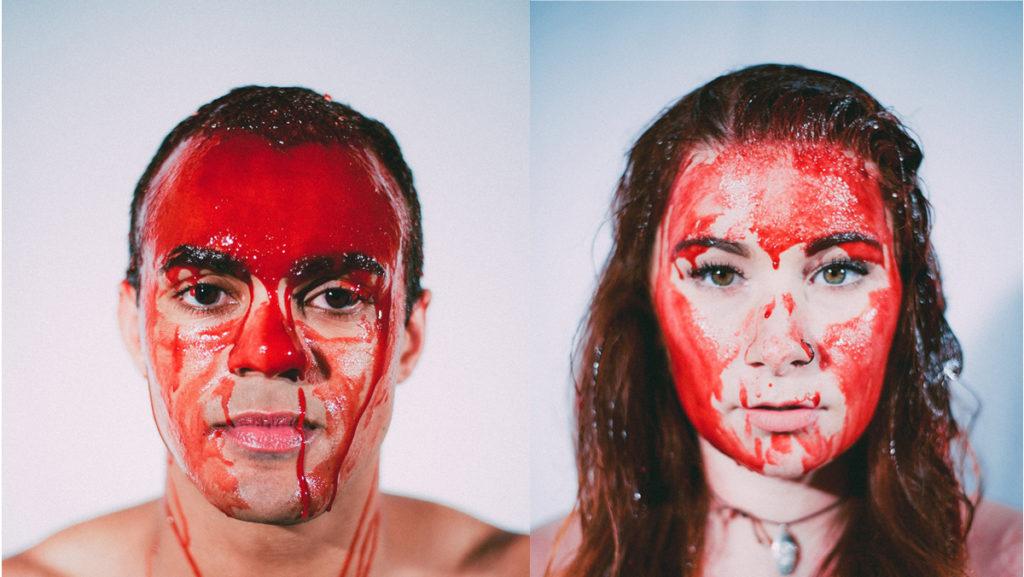They are likely to catch the eye of anyone scrolling idly through their news feed: close-up portraits of college students, staring straight into the lens, apparently covered in blood.
The photos, which have gone viral this week after the mass shooting in Orlando, Florida, on June 12 and World Blood Donor Day on June 14, are part of a campaign by Ithaca College students and alumni called “My Blood Is Good.”
The campaign, which also includes a Change.org petition that will be sent to the Food and Drug Administration, aims to raise awareness of what the participants say are discriminatory blood–donation restrictions put in place by the FDA. Some of the photos are captioned with references to the FDA recommendations, which ban men who have had sex with men within the last year — abbreviated as MSM, women who have had sexual contact with any MSM within the last year and people who have gotten tattoos or piercings at unregulated facilities within the last year.
These policies are intended to keep blood-related illnesses, particularly HIV, from being transmitted via transfusion.
Kyle James ’16 said he got the idea for the campaign in late April, after he was unable to donate blood at a Red Cross blood drive at the college because of his sexual history. He took a selfie in front of the Red Cross donation van, using the hashtag #MyBloodIsGood to express his disappointment and outrage over the policy. However, when he told his friends about the experience later that day, he learned many of them were unaware of the policies.
https://www.instagram.com/p/BEYhgMEomUP/
“I found that people didn’t know that the ban against gay people donating blood existed,” he said. “The bans also include heterosexual women, trans people and people with tattoos or piercings, so there are many people who cannot donate because of their identity.”
From 1983 until December 2015, FDA recommendations banned all gay men from donating blood during their lifetime. Then, the restrictions were relaxed, banning only men who have had sexual contact with another man within the past year. However, Marlowe Padilla ’16, who took and edited the photos for the campaign, said the restrictions are still discriminatory against gay and bisexual men, perpetuating the idea that HIV is a “gay disease.”
“These regulations, even with the recent ‘lift’ this past December, still does not do the members of the LGBTQ+ community justice,” Padilla said. “We are basing these restrictions not on data and research but out of fear.”
[gss ids=”11520,11519,11518,11517,11516,11515,11514,11513,11512,11511,11510,11509,11508,11507,11506,11505,11504″ carousel=’fx=carousel’ options=’loop=2&pause-on-hover=true&timeout=2000′]
In a press release emailed to The Ithacan, Tara Goodin, a press agent in the Office of Media Affairs at the FDA, said the FDA’s recommendations are based on behavior, not sexual orientation. While the FDA considered self-reporting methods instead of time-based deferrals, she said self-reporting has been unreliable in the United States.
“Current epidemiology shows that a history of male-to-male sexual contact was associated with a 62-fold increased risk for being HIV positive, whereas the increase in risk for a history of multiple sexual partners of the opposite sex in the last year was 2.3-fold,” Goodin stated in the release.
She said the FDA would continue to research the issue and consider updating its blood donation policies as new scientific studies became available.
With the recent mass shooting at the Pulse nightclub in Orlando on June 12 and World Blood Donor Day on June 14, these recent events have drawn widespread attention to the message James was trying to convey all along.
“It’s definitely drawn awareness to the campaign, but it’s so upsetting that it took this tragedy for this to be an issue,” James said. “These people lost their lives because of homophobic actions. World Blood Donation Day was this week. A lot of things have happened to make this issue very relevant, but I think it was already.”








